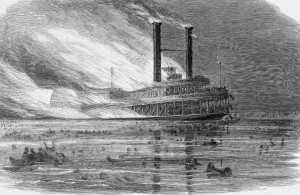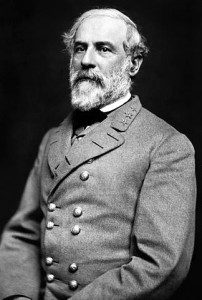The Sultana is the Deadliest Maritime Tragedy in United States History
April 27, 1865
Camp Fisk Prisoners Of War Camp
Camp Fisk, near Vicksburg, Mississippi, was a prisoner of war camp holding many Federal prisoners. On April 10, 1865 Confederate authorities sent orders to Camp Fisk for release on parole of all its prisoners. This order came the day after Confederate General Robert E. Lee surrendered the Army of Northern Virginia to General Ulysses Grant at Appomattox Court House, Virginia.
The Union prisoners of war at Camp Fisk previously were prisoners at camps such as Cahaba (Castle Morgan), near Selma, Alabama and at the hellhole known as Andersonville, in Georgia. The majority of these freed prisoners from Camp Fisk had suffered long, hard, imprisonments and the strain of existing in a Civil War prisoner of war camp had taken a toll on their health. They were weak with disease and malnourished, their release from Camp Fisk was a welcomed blessing … and a supposed lifesaver.
The Civil War was ending. The freed prisoners looked forward to shedding their old, worn, filthy war uniforms for new, and soon happily returning to their families and homes. Now on their path to freedom, the parolees would have to make a trip up the Mississippi River from Camp Fisk to Cairo, Illinois.
The Sultana Used To Transport Freed Prisoners Of War
To move these former prisoners of war up the river to Cairo, the Federal government contracted with private steamboat lines. The steamship Sultana was hired to help transport men.
The Sultana was loaded with over 2,000 parolees and other passengers as it began its voyage to Cairo. The Sultana was severely and dangerously overloaded as this steamship was designed to carry only a mere 376 passengers. There were four boilers in the Sultana and all of them required patching at one time or another. The stress of hauling this overload of human cargo proved too much for the Sultana.
Three Sultana boilers exploded about seven miles above Memphis.
What parts of the Sultana that were not immediately blown to bits by the explosion, soon caught fire. The passengers who were not killed outright in the explosion now found they were facing flames or they were thrown into the muddy currents of the Mississippi River.The freed prisoners were weak and sick from their captivity, many of them did not know how to swim and were injured by the boiler explosions. For many of these poor men, men who had survived cruel prisoner of war captivity and treatment, their final fate was drowning in the Mississippi.
The figures vary, but 783 to 786 people were rescued from the muddy Mississippi waters. Those saved from the water were taken to Memphis hospitals. Sadly, 200 of them later died from their ordeal. Estimates are that between 1,500 and 1,700 people died because of the Sultana explosion.
The remnants of the Sultana explosion drifted down the Mississippi River, eventually sinking opposite the city of Memphis. Today, the Sultana’s remnants are buried deep in mud at the bottom of the Mississippi River.
More people died in the Sultana explosion, than died when the Titanic sank in April of 1912.

